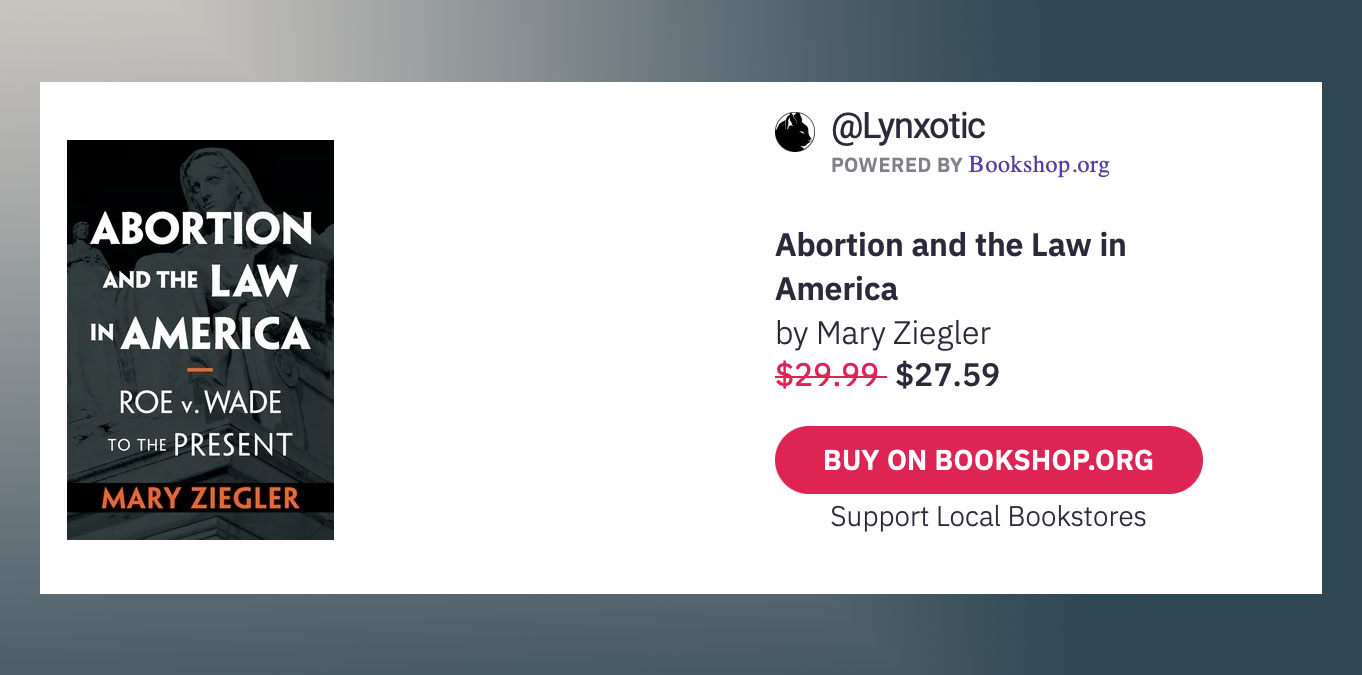Books
Best Roe v. Wade Books to Understand the SCOTUS Debate
Published
2 years agoon
The 50th anniversary of Roe vs. Wade is approaching, we are also dealing with the likelihood that the Supreme Court is now reconsidering the ruling, as a result, an interest on the issues surrounding abortion and reproductive rights has peaked.
Reproductive justice, or the human right to maintain personal bodily autonomy (in other words the ability to choose whether to have or not have children) has and most likely will always be a hot button issue, one that triggers immediate and intense reactions from both pro-life and pro-choice advocates.

Understandably so, abortion touches on huge subject matters that can intersect with religious beliefs, what qualifies as life and death in which people tend to have their own very strong opinions.
Below we have curated a list of 5 books that can help readers interested in educating oneself and understanding more on what is currently happening by looking at the past. These texts break down legal, political and social foundations regarding abortion. As well as speak to the very real issues surrounding abortion like violence, stigma, politics, race, access to medicine and law.
We have provided additional information on each book including publisher’s descriptions and where to learn more about each title:
Liberty and Sexuality: The Right to Privacy and the Making of Roe V. Wade

Roe v. Wade’s 1973 constitutional guarantee of a woman’s right to choose abortion emerged from a long and remarkable battle to extend Americans’ individual liberties to include a fundamental right to sexual privacy. Only in 1965 had the Supreme Court first begun to protect such intimate personal freedoms by finally invalidating an archaic Connecticut criminal law that had prohibited the use of birth control.
Despite the landmark importance of this crucial struggle, not until now has this legal revolution received the comprehensive treatment it deserves. Roe v. Wade’s origins lie not in the U.S. Supreme Court’s dramatic internal deliberations of 1971-72 or even in the grassroots women’s movement of the late 1960s but, instead, in the 1920s and 1930s efforts to win repeal of the Connecticut birth control law. Those initial attempts failed, but twenty years later Connecticut Planned Parenthood director Estelle Trebert Griswold launched a new crusade against the statute. After one appeal to the U.S. Supreme Court lost by the narrowest of margins in 1961, Griswold and a medical colleague were convicted for providing birth control services in open defiance of the law. When their appeal finally reached the Supreme Court, the justices held that such a fundamental constitutional right to privacy did indeed exist.
That resounding Supreme Court decision in Griswold v. Connecticut opened a previously unimagined constitutional door: the opportunity to argue that a woman’s access to a safe, legal abortion was a fundamental individual right. In 1969, the first abortion rights case was filed in federal court in New York, soon followed by others, including Roe v. Wade in Texas and Doe v. Bolton inGeorgia. After those two challenges were upheld by local federal courts, the U.S. Supreme Court – which so far had confronted the abortion issue on only one occasion – agreed to review both decisions. The comprehensive, once-secret files of former Justices William J. Brennan, William
Before Roe V. Wade: Voices That Shaped the Abortion Debate Before the Supreme Court’s Ruling

The Supreme Court’s 1973 decision in Roe v. Wade legalized abortion-but the debate was far from over, continuing to be a political battleground to this day. Bringing to light key voices that illuminate the case and its historical context, Before Roe v. Wade looks back and recaptures how the arguments for and against abortion took shape as claims about the meaning of the Constitution-and about how the nation could best honor its commitment to dignity, liberty, equality, and life.
In this ground-breaking book, Linda Greenhouse, a Pulitzer Prize-winning journalist who covered the Supreme Court for 30 years for The New York Times, and Reva Siegel, a renowned professor at Yale Law School, collect documents illustrating cultural, political, and legal forces that helped shape the Supreme Court’s decision and the meanings it would come to have over time.
A new afterword to the book explores what the history of conflict over abortion in the decade before Roe might reveal about the logic of conflict in the ensuing decades. The entanglement of the political parties in the abortion debate in the period before the Court ruled raises the possibility that Roe itself may not have engendered political polarization around abortion as is commonly supposed, but instead may have been engulfed by it.
Defenders of the Unborn: The Pro-Life Movement Before Roe V. Wade

On April 16, 1972, ten thousand people gathered in Central Park to protest New York’s liberal abortion law. Emotions ran high, reflecting the nation’s extreme polarization over abortion. Yet the divisions did not fall neatly along partisan or religious lines-the assembled protesters were far
from a bunch of fire-breathing culture warriors. In Defenders of the Unborn, Daniel K. Williams reveals the hidden history of the pro-life movement in America, showing that a cause that many see as reactionary and anti-feminist began as a liberal crusade for human rights. For decades, the media portrayed the pro-life movement as a Catholic cause, but by the time of the Central Park rally, that stereotype was already hopelessly outdated. The kinds of people in attendance at pro-life rallies ranged from white Protestant physicians, to young mothers, to African American
Democratic legislators-even the occasional member of Planned Parenthood. One of New York City’s most vocal pro-life advocates was a liberal Lutheran minister who was best known for his civil rights activism and his protests against the Vietnam War. The language with which pro-lifers championed their
cause was not that of conservative Catholic theology, infused with attacks on contraception and women’s sexual freedom. Rather, they saw themselves as civil rights crusaders, defending the inalienable right to life of a defenseless minority: the unborn fetus. It was because of this grounding in
human rights, Williams argues, that the right-to-life movement gained such momentum in the early 1960s. Indeed, pro-lifers were winning the battle before Roe v. Wade changed the course of history. Through a deep investigation of previously untapped archives, Williams presents the untold story of New Deal-era liberals who forged alliances with a diverse array of activists, Republican and Democrat alike, to fight for what they saw as a human rights cause. Provocative and insightful, Defenders
of the Unborn is a must-read for anyone who craves a deeper understanding of a highly-charged issue.
What It Means to Be Human: The Case for the Body in Public Bioethics

One of the Wall Street Journal‘s Top Ten Books of the YearA leading expert on public bioethics advocates for a new conception of human identity in American law and policy.The natural limits of the human body make us vulnerable and therefore dependent, throughout our lives, on others. Yet American law and policy disregard these stubborn facts, with statutes and judicial decisions that presume people to be autonomous, defined by their capacity to choose. As legal scholar O. Carter Snead points out, this individualistic ideology captures important truths about human freedom, but it also means that we have no obligations to each other unless we actively, voluntarily embrace them. Under such circumstances, the neediest must rely on charitable care. When it is not forthcoming, law and policy cannot adequately respond. What It Means to Be Human makes the case for a new paradigm, one that better represents the gifts and challenges of being human. Inspired by the insights of Alasdair MacIntyre and Charles Taylor, Snead proposes a vision of human identity and flourishing that supports those who are profoundly vulnerable and dependent–children, the disabled, and the elderly. To show how such a vision would affect law and policy, he addresses three complex issues in bioethics: abortion, assisted reproductive technology, and end-of-life decisions. Avoiding typical dichotomies of conservative-versus-liberal and secular-versus-religious, Snead recasts debates over these issues and situates them within his framework of embodiment and dependence. He concludes that, if the law is built on premises that reflect the fully lived reality of life, it will provide support for the vulnerable, including the unborn, mothers, families, and those nearing the end of their lives. In this way, he argues, policy can ensure that people have the care they need in order to thrive. In this provocative and consequential book, Snead rethinks how the law represents human experiences so that it might govern more wisely, justly, and humanely.
Abortion in America: The Origins and Evolution of National Policy, 1800-1900a

“A fascinating book which sets to rest a number of preconceptions on the subject. Easy to read and yet hard-hitting.”–Marlette Rebhorn, Austin Community College
“Should be an eye-opener to those who think that religious objections were at the root of anti-abortion legislation and equally to those who think that abortion has been a matter of life and death.”–Carl N. Degler, Stanford University
“A superb example of the way history can inform a current contentious controversy.”–Journal of American History
“Mohr makes it abundantly clear that Supreme Court decisions of the 1970s were not a modern weakening of moral standards but a return to what Americans believed and practiced a hundred years ago.”–The Christian Century
“An altogether lucid review of American abortion policy in the 19th century.”–Christopher Lehmann-Haupt, The New York Times
“The history of how abortion came to be banned and how women lost…rights previously thought to be natural and inherent over their own bodies is a fascinating and infuriating one.”–Chicago Tribune
James C. Mohr is the College of Arts and Sciences Distinguished Professor of History and the Philip H. Knight Professor of Social Science at the University of Oregon. He is author of Doctors and the Law: Medical Jurisprudence in Nineteenth-Century America and Radical Republicans in the North: State Politics during Reconstruction, both published by Johns Hopkins.
For purchase information on Amazon, check out below:
| Abortion in America |
| Liberty and Sexuality |
| Before Roe V. Wade |
| Defenders of the Unborn |
| What It Means to Be Human |
Related Articles:
- Is 2023 the year for Virtual Reality Workouts?
- Fitness with Apple Watch: A Day in the Life of Highly Motivated Ring Closers
- Goodbye Twitter, Hello Mastodon!
- The Vision of Steve Jobs for the Future of Apple has Barely Begun to Emerge
- Is This Jason Statham Video Real or Deepfake TikTok Account? You Decide
Find books on Music, Movies & Entertainment and many other topics at Bookshop.org
Lynxotic may receive a small commission based on any purchases made by following links from this page


